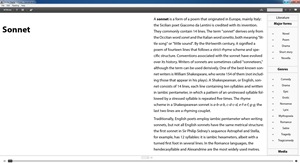Posted on 2012-Sep-19
McGraw-Hill saw the potential in the digitization of textbooks a few years back and seized the opportunity to implement the interactive after-class self-study to help students learn “smarter”. Rote memorization and the weighty academic bibles seem to be inadequate in the current climate of learning evolution since tablets and smartphones have already occupied the student’s backpack and pocket respectively. Those gadgets can instantly access the web to make studying more productive and instantaneous.
Mobile applications respond to the academic life by offering dictionary software or encyclopedic link to research topics. With native support from Google, image search can be properly done in seconds if you are on 3G connection. In the wireless world of high-speed communication, textbooks are not the solely exclusive choice to study any longer.
Wikipedia Goes EPUB
Given the fact that Wikipedia offers customized book according to the reader’s decision to add any article and reorder it to make a book, there is no need to massively print several topics to be stored in folders. For example, any topic relevant to a subject can be exported to a single ePUB file for a pleasant reading experience. My book of literature is crammed with sonnet, figures of speech, and so on plus the playful alphabets “aa” to personalize the book creation and make sure that this is not the result from an automated bot.

Interactive Tutoring
Having introduced LearnSmart since 2009, McGraw-Hill hooked up with more than 1,200 colleges in 60 different courses to implement “out-of-class study time” that students can virtually utilize anywhere like a personal tutor.
Creating profiles on the system enables it to shape your learning experience based on the usage. Picture being mentored by the accessible tutor anytime is an amazing opportunity for students who need not only rely on instructors to do their own research.
Textbooks in Thailand
In Thailand, Ramkhamhaeng University started rolling out their electronic textbook service on their website in 2001 and a distance learning program called mLearning. Although the web web-browsing experience is on par with major websites, the dated PDF needs to be zoomed in and out frequently to read the text comfortably. Again, the format automatically discourages mobile reading due to the smaller screen.
Talking to a taxi driver in Bangkok this morning made me learn how he used the wooden tablet instead of notebooks fifty years ago at the school in a remote area of Thailand. It is undeniable that ePUB is significantly becoming a novel standard. Considering the latest Wikipedia’s move towards digitized textbook, a personalized virtual classroom does not sound so distant, don’t you think? Time will decide.
Label: eBook Industry News
comments powered by Disqus